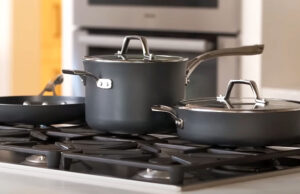As an Amazon Associate, I earn from qualifying purchases at no extra cost to you.
9 Signs Your Convection Oven Needs Maintenance
Convection ovens are an essential kitchen tool, making cooking easier and faster by circulating hot air around food. But like any appliance, they need proper care to keep running smoothly. Over time, parts can wear out or get dirty, which may affect their performance. So, how do you know when it’s time for maintenance? In this article, we’ll go over 9 signs that your convection oven might need some attention. Stay tuned for easy-to-understand tips to ensure your oven is working at its best!
Oven Isn’t Heating Properly
One of the first signs that something might be wrong with your convection oven is when it stops heating evenly or doesn’t get hot enough. Convection ovens rely on a fan to circulate hot air, ensuring food cooks evenly. If the oven isn’t reaching the right temperature, or food is cooking unevenly, it could be a sign of a few things.
First, check the temperature settings to make sure they’re correct. If the oven still isn’t heating right, the thermostat may be malfunctioning. This part controls the temperature inside the oven, and if it breaks or gets dirty, it won’t be able to regulate heat properly. Sometimes, the heating elements themselves might need attention. The fan may also be the culprit if it isn’t working, causing the hot air not to circulate.
To fix these issues, you might need to replace the thermostat or heating elements. It’s always a good idea to get the oven checked by a professional if you’re unsure. Ignoring this problem can lead to overcooked or undercooked meals, and nobody wants that!
Oven Is Making Strange Noises
Noises are a common issue in convection ovens, and if you hear strange sounds, it’s time to take notice. A loud or unusual noise could mean something’s not functioning properly. Typically, the fan inside the oven creates some noise as it circulates hot air, but if the sound changes, becomes louder, or sounds like grinding, there may be an issue with the fan motor.
When the fan motor starts to wear out or the fan blades get dirty, it can cause the oven to make odd noises. If the noise is coming from the fan, it could be due to debris buildup inside the motor or even a loose fan blade. Sometimes, it’s just a matter of cleaning the fan or tightening the parts. However, if the motor is damaged, you may need to replace it to avoid further damage.
Another possible cause of strange noises is the oven’s heating elements. If they are loose or malfunctioning, they might create buzzing or sizzling sounds. Pay attention to any unusual noise patterns, as this can help pinpoint the exact cause of the issue.
Oven Is Showing Error Codes
Many modern convection ovens come with digital displays that show error codes when something goes wrong. These codes can indicate anything from a malfunctioning part to a more complex issue with the oven’s internal electronics. While it’s tempting to ignore these codes, it’s important to pay attention to them, as they could be signaling a bigger problem.
Error codes often point to specific issues, such as problems with the thermostat, fan, heating elements, or even electrical connections. Most of the time, you can find the meaning of the error codes in your oven’s manual or on the manufacturer’s website.
If you’re not sure how to fix the issue, it’s a good idea to call a technician. Sometimes, these problems are beyond what you can fix yourself, and a professional can help resolve them before they cause more damage.
Oven Door Won’t Close Properly
If your convection oven door won’t close properly, it’s more than just an inconvenience—it can also affect the performance of your oven. An oven door that doesn’t seal tightly can cause heat to escape, leading to uneven cooking and wasted energy. This could be due to a broken seal, misaligned hinges, or a faulty latch.
Start by checking the oven door seal. Over time, seals can wear out, crack, or become dirty, which can cause them to lose their ability to create a proper seal. You can clean the seal with a damp cloth or replace it if it’s damaged. If the door still doesn’t close properly after cleaning or replacing the seal, the hinges might be misaligned or need lubrication.
In some cases, you may need to replace the entire door latch if it’s not working correctly. Getting this issue fixed will not only improve cooking performance but will also save energy by keeping heat inside the oven.
Food Is Not Cooking Evenly
When your convection oven isn’t cooking food evenly, it’s a sign that something isn’t working right. Since convection ovens rely on air circulation for even cooking, this could be caused by a problem with the fan, thermostat, or even the oven’s placement.
If the fan is broken, it won’t be able to circulate hot air around the food, leading to uneven cooking. You might notice that one side of your food is overcooked while the other side is undercooked. This could also be a thermostat issue, where the temperature is not being maintained evenly throughout the oven.
In this case, try cleaning the fan and the air vents to see if this improves airflow. If the problem persists, it might be time to have a technician inspect the oven. It’s important to get this fixed quickly to avoid ruining your meals.
The Oven Is Taking Longer to Cook
Another sign that your convection oven might need maintenance is if it’s taking longer than usual to cook food. This could mean that the oven is not reaching the right temperature, or it could be a sign of something more serious, like a malfunctioning heating element or fan.
When an oven takes too long to cook, it’s usually because it’s not producing or circulating enough heat. This could be due to a faulty thermostat, a worn-out fan, or a heating element that’s starting to fail. It’s best to check the oven’s temperature with an oven thermometer to see if the oven is getting hot enough.
If you find that the temperature is too low, it may be time to replace the thermostat or the heating elements. A professional repair technician can help you diagnose and fix the issue so your oven can cook food properly again.
The Oven Is Smelling Strange
If you notice a strange smell coming from your convection oven, it could be a sign of something wrong inside. A burning smell might indicate that food debris, grease, or other buildup inside the oven is starting to burn. This is common if you don’t clean your oven regularly.
A musty or moldy smell could suggest moisture buildup, which can lead to rust or mold inside the oven. This can happen if the oven door is not sealed properly, allowing humidity to get inside. Whatever the smell is, it’s essential to clean your oven thoroughly to remove any buildup and prevent further issues.
If cleaning doesn’t solve the problem, there may be a more serious issue with the oven’s electrical components, and you should contact a professional to inspect it.
The Oven’s Light Is Out
Sometimes, the problem with your convection oven can be as simple as a burnt-out light bulb. If the oven light isn’t working, you might find it difficult to monitor your food while it cooks. The oven light typically works when the door is opened or when the oven is in use, and it’s usually an easy fix.
Start by replacing the bulb to see if that solves the issue. If the light still doesn’t work after replacing the bulb, there might be a problem with the oven’s electrical system. This could be something as simple as a blown fuse or as complicated as a wiring issue. In either case, it’s best to have a professional check it out to ensure the problem is fixed correctly.
Your Oven Is Not Turning On
If your convection oven isn’t turning on at all, it’s one of the most obvious signs that something is wrong. There could be several reasons for this, including a blown fuse, a tripped circuit breaker, or an issue with the power supply. If the oven is plugged in and the power is on, but it still won’t turn on, it could be an issue with the internal components.
Check the power cord and ensure it’s properly plugged in. Also, check if the circuit breaker has tripped and reset it if necessary. If everything looks fine, but the oven still won’t turn on, it’s time to call in a professional to diagnose the issue.
I hope this article helped you identify the signs that your convection oven might need maintenance. Regular care and maintenance can keep your oven running smoothly for years to come, so don’t ignore these issues when they arise. By staying on top of problems, you’ll ensure your convection oven is always ready to cook your favorite meals!
Frequently Asked Questions
Is it normal for a convection oven to make noise?
Some noise is normal as the fan circulates hot air. However, strange or loud noises may indicate a problem with the fan or motor.
Can I clean my convection oven myself?
Yes, you can clean your convection oven yourself. Regular cleaning of the fan, heating elements, and oven interior helps keep it running smoothly.
Do I need to replace the thermostat if it’s malfunctioning?
If your convection oven’s thermostat is malfunctioning, you may need to replace it. A professional technician can help determine if a replacement is necessary.
Is it safe to use a convection oven with a broken door seal?
It’s not safe to use a convection oven with a broken door seal, as it can cause heat to escape and lead to uneven cooking or wasted energy.
Can a convection oven overheat?
Yes, a convection oven can overheat if there’s an issue with the thermostat, fan, or heating elements. If your oven overheats, it’s essential to get it inspected.
Do I need a professional to fix my convection oven?
While some minor issues can be fixed yourself, more complex problems like broken thermostats or malfunctioning fans usually require a professional technician.
Is it expensive to maintain a convection oven?
The cost of maintenance depends on the issue. Regular cleaning is inexpensive, but repairs like replacing heating elements or the thermostat may cost more.
Can a convection oven last for many years?
Yes, a convection oven can last for many years with proper care and maintenance. Regular cleaning and timely repairs will help extend its lifespan.




